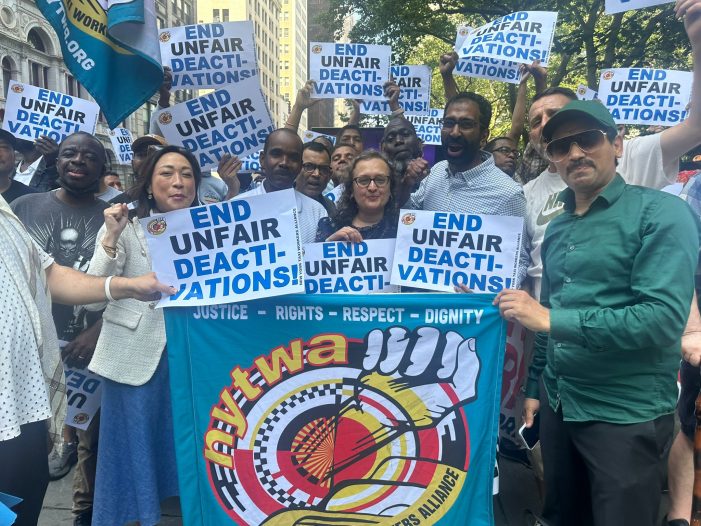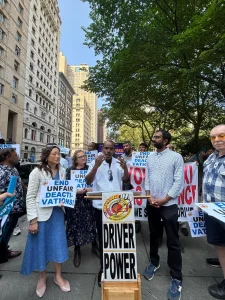By Fenix Suriel | Photos credit: The New York Taxi Workers Alliance
New York, NY: The New York Taxi Workers Alliance (NYTWA) hosted a rally to urge the city council to support a bill protecting drivers against vehicle service companies.
Int 0276 is a bill that prohibits vehicle service companies such as Lyft and Uber from wrongfully deactivating drivers. It is sponsored by New York City Council Member Shekar Krishnan and Councilmember Linda Lee, who attended the rally, among 11 other Councilmembers who were absent.
The bill would give drivers the power to appeal and fight any act of deactivation by service apps like Uber and Lyft. Other implications include a 14-day notice before deactivation and the chance for drivers deactivated as far as one year ago to request an appeal.
“Uber treats drivers as expendable,” said Bhairavi Desai, Founder and Executive Director of NYTWA, in front of a crowd of outraged service drivers. “And this must come to an end,” she pleaded.
While Uber and Lyft claim to maintain deactivation policies to ensure rider safety and service quality, the reasons for deactivation range from low ratings and community guidelines violations to background check issues or passenger complaints.
Uber also claims that they allow drivers to provide additional information and request reviews for their deactivation. But drivers say cooperation isn’t always adequate.
NYTWA Blerim Skoro was an Uber driver for almost 10 years. After nearly 10 years of service, Uber deactivated him in February despite being a Diamond status driver with a 100 percent ride acceptance rate and 50,000 rides under his belt. Diamond status is the highest rating Uber gives drivers with the highest reviews from riders and who turn down the fewest fares dispatched by the company. Skoro remembers the incident that got him deactivated.
He says a passenger complained to Uber because Skoro refused to drop him off at an alternative destination. He pleaded for his case with Uber, but the company refused to accept the dashcam in the car.
“They charged me, they accused me, and they sentenced me. No appeal,” said a frustrated Skoro.
Skoro is just one of many Uber and Lyft drivers who were laid off without appeal or a proper case. NYTWA member and App driver Saif Aizah: “Uber unfairly deactivated me over paperwork; now I only have Lyft. Since I only drive for Lyft, my earnings have gone down by more than half. Working with only 50% of my earnings, I’m already struggling to pay my rent, car payments, insurance, etc. I am drowning in debt; my financial life is a tragedy. This puts a lot of stress on my mental health, to the point where I feel like I’m gonna have a mental breakdown. And some nights, I can’t sleep worrying about how I will pay my bills. What is even worse is how do I face my kids? With this unfair deactivation, I have become financially unable to put food on the table. Unfair deactivation makes my life miserable; we need a bill to protect drivers from unfair deactivation. We pay for the car, we maintain our cars, we pay the car insurance, we have rent, etc. With all these expenses, the losses, and the financial crises I’ve been through since I was deactivated, the City Council must approve this bill. A bill that will protect drivers from unfair deactivation and allow you to defend yourself.”
Uber and Lyft do not publicly disclose deactivation records. However, a coalition of labor groups conducted a survey that found that 40% of app drivers had been deactivated at some point in 2023.
Since most ride-hail drivers are classified as independent contractors, they are not entitled to the same protections as employees. That means no severance pay, no formal grievance procedure, and no access to unemployment insurance.
Of all those workers deactivated, more than half believed it was unjust or based on false information.
Many drivers are deactivated due to unverifiable customer complaints, algorithmic flags, or abrupt changes in background check criteria. With little transparency or recourse, drivers are often left in the dark about why they were removed from the platform.
The rally was held on the west side of City Hall in Manhattan.
“We must have this driver protection in our city,” said Councilmember Krishnan. “Our city owes an incredible debt of gratitude to you,” he added.
About Intro 0276:
- It puts the burden of proof on Uber/Lyft in deactivation cases – not on the drivers!
- Uber/Lyft must follow standards for good cause if they deactivate drivers.
- In most cases, Uber/Lyft must give 14 days’ notice before taking drivers off the app.
- Drivers will have an independent appeal process not controlled by the companies: arbitration, going to court, or filing a complaint with the city agency. Thus, drivers can choose what works best for them.
- Uber/Lyft must engage in “progressive discipline,” meaning the serious punishment of deactivation must fit the violation, and drivers must be made aware of behavior that the companies consider a violation.
- Allows drivers to get reinstatement and backpay (lost earnings for the time they were deactivated) if deactivated without good cause
- Drivers deactivated over the past 6 years from the date the bill goes into effect would have one year to appeal their cases independently.
____
Fenix Suriel is a journalist based out of New York City and a student at the Craig Newmark Graduate School of Journalism.


